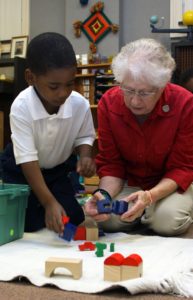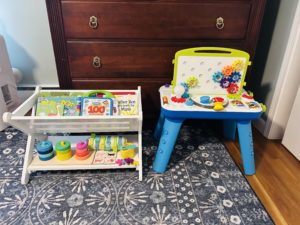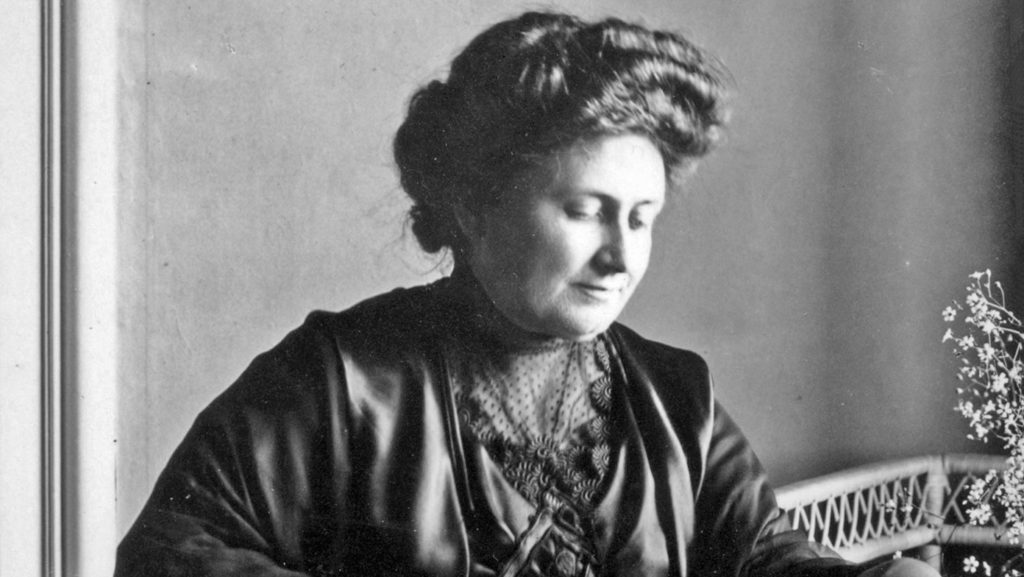From the moment a new mother enters a question about pregnancy into the Google search bar, she’s served a barrage of ads, timed and synced with her baby’s growth. They all promise the best products, courses, and tools for her child’s development in and ex utero.
But besides the childrearing advice she’s probably getting from relatives, the modern mom must also discern what to make of the growing hive of online influencers who want her to know about everything from gentle parenting to pediatric gut health to the best methods of sleep training.
Among the ads I saw during my first pregnancy were those for a Montessori-inspired subscription service. Every few months, I’d be sent a box of objects for play and motor skill development that would align with my child’s neurological and physical capacities. “Right toys, right tools, right time,” they promised.
Knowing very little about early childhood and feeling at the mercy of experts (real or self-appointed), I signed up for it.
I had a cursory knowledge of Maria Montessori’s approach to early childhood, having a few Catholic friends who were devotees. Some of them followed it loosely, opting for wooden toys instead of ones that stimulate with light and noise. Others were all-in, even furnishing and remodeling their homes according to Montessori standards.
Month after month, I worried that I was going down a path that could be both rigid and expensive. And yet, I watched my son engage the items in a way he didn’t with anything else. Hours would pass with him simply pulling cloth tissues out of a box or washing dishes in a miniature sink while I did our family’s in the kitchen.
In the millennial parenting orbit, there’s palpable pressure to provide each child with optimal stimulation, engagement, and one-on-one time. I wondered: if God himself asked, “What father among you would hand his son a snake when he asks for a fish?” was it OK to have some plastic toys around, or use the TV as an occasional babysitter in order to make dinner?

Reality ultimately dictated that we took a mixed-Montessori approach. My husband and I have arranged some areas of our home so that our three boys can more easily operate independently, from getting their cups and plates to reaching books and items of clothing. But we’re not averse to occasionally putting the kids in a television trance when we need two hands for a task.
Still, I’ve wanted to learn about the woman behind the method. My curiosity led me to “The Child is The Teacher” (Other Press, $28.99), the 2020 biography of the Italian physician and educator written by Cristina De Stefano.
After finishing De Stefano’s portrait, it is clear why Montessori (1870-1952) has remained the premier “influencer” of early childhood education here and abroad. But her life itself provides its own kind of education, one that will shape my motherhood moving forward. I think if more parents knew about the woman behind their children’s toys and tools, the “revolution of tenderness” Pope Francis calls for would be right around the corner.
First, Montessori recognized Christ in the “least of these,” particularly the most disadvantaged children in her society. While studying medicine, Montessori volunteered in Rome’s Soccorso e Lavoro (Mutual Aid and Labor) pediatric clinic, dedicated to treating the poorest children in the city. She would also go on to work in one of the city’s asylums, where children with mental and physical illness were shuttered.
“In that ward … she intuits that [they] are in need of special treatment to stimulate them and prompt them to reach higher,” De Stefano wrote.
She became their champion, arguing that children are special kinds of creatures with a potency for learning that far outstrips that of adults. She made the case for their dignity, something that was not universally acknowledged by her contemporaries.
“For thousands and thousands of years, humanity had passed right by children, remaining totally insensitive to this miracle of nature that is the formation of an intellect, of a human personality,” she said.
Montessori believed that children deserved adults who would rearrange things to better foster the emergence of their personality, cognition, and spirit. She wanted us to literally and figuratively make room for children as they are and as they come to us.
I kept thinking about our culture’s diminishing birth rate, record abortion numbers, and the pervasive idea that every child should be wanted and planned. But she also prompted me to look inward and to more cheerfully make room for my own children. It’s easy to forget that wiping spills, changing diapers, and providing comfort in the middle of the night are all things I am doing for Jesus, who reminds every parent that “you did it for me.”
Second, Montessori’s life would seem to underscore our cultural assumption that women cannot be mothers and contribute meaningfully to society. But a closer look reveals that motherhood can be a catalyst for creativity.
When Montessori found herself pregnant and unmarried, she made the harrowing decision to send her newborn son, Mario, to live with a wet nurse and her family. At the time and as was customary, Montessori could have married the child’s father but would have had to give up her career. Her mother, Renilde, encouraged the decision, determined that nothing would derail her daughter from her pioneering work.

Heartbroken, Montessori would pray each night: “Give all the sorrows to me and leave all the joys to him.” She put her head down and got to work, leaning on her faith and sense that her career was a sort of vocation.
Mario’s absence would haunt her until they were reunited later in his life. Eventually, he would become one of her closest collaborators. But he remained the reason for her single-minded commitment to perfecting her method. Her schoolhouses and materials were designed to “[make] the child feel that they are loved, and [push] them to love in return…”
Motherhood is a powerful motivator. One of my friends has gone back to school nearly 20 years after her first master’s degree to study occupational therapy, wanting to better support her child with special needs. Or consider a mother I interviewed for these pages, who gave up her work as a foreign correspondent when her first two children were born, only to become the children’s book critic at the same news outlet.
When I find myself worrying about having stepped out of full-time work to raise my sons, I remember that I have no idea where mothering them might take me.
Last, Montessori’s insights about children’s desire for beauty, order, and silence are a timely counterweight to popular parenting advice today.
“She says over and over that to speak to the child’s soul, things have to be beautiful,” De Stefano said. It will only do our children half-good if we give them clean, non-GMO food and dress them in organic cotton but fail to give them quality art, literature, and moral beauty.
The idea that children can “tell us who they are” is not something Montessori could ever have conceived. She understood that children need freedom to learn — but within a structured environment. For her, discovery is not the process of picking and choosing from nothing — it is recognizing how the laws of nature work and then freely moving within them.
She also observed that kids have “a capacity for attention far superior to that of adults,” in De Stefano’s words. Montessori even compared their play to work and at other times to meditation.
It’s easy to second guess myself for opting for unstructured play when I hear peers scheduling wall-to-wall activities for their kids. I’ve certainly felt judged by neighbors for letting my children play outside without me, even if they are in my line of sight or within earshot. And her observations have reminded me to slow down. Children are anything but efficient. Their pace is slower, but also punctuated with wonder.
I now lean on Montessori as a type of coach, reminding me to intervene only if they are in danger, and not to worry if I let them play with sticks for an hour. According to her, that’s the most important work they and I have done all day.
Today’s parents and experts could use a Montessori education — a look at her method, to be sure, but also at her remarkable life.

